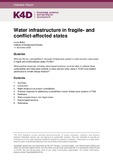| dc.contributor.author | Bolton, Laura | |
| dc.date.accessioned | 2020-11-26T16:50:07Z | |
| dc.date.available | 2020-11-26T16:50:07Z | |
| dc.date.issued | 2020-11-11 | |
| dc.identifier.citation | Bolton, L. (2020). Water infrastructure in fragile- and conflict-affected states. K4D Helpdesk Report 912. Brighton, UK: Institute of Development Studies. | en |
| dc.identifier.uri | https://opendocs.ids.ac.uk/opendocs/handle/20.500.12413/15802 | |
| dc.description.abstract | This rapid review examines evidence on the key vulnerabilities in the water infrastructure system in urban and peri-urban areas in fragile and conflict-affected states (FCAS). It also focuses on the practical measures, including nature-based solutions, could be taken to address these vulnerabilities and make water systems in urban and peri-urban areas in FCAS more resilient (particularly to climate change impacts). The key weaknesses identified in water infrastructure systems in urban and peri-urban areas in FCAS are: Internal displacement increases demand for water in urban areas as well as increasing wastewater discharge; Alternative service providers which are unregulated, more expensive and of lower quality; Naturally where the state is not functioning, coordination of water services and funding is lacking; The humanitarian system which supports FCAS can be uncoordinated and changeable; There may be physical damage to infrastructure caused by violence; Emigration of qualified water engineers; In some urban areas in Syria conflict has affected electricity supply which in turn affects water supply; Conflict damages financial sustainability of utilities; More knowledge is required on water quality and processes. Some literature suggests that urban needs are under-recognised as traditionally water projects have focussed on agricultural needs in rural areas and population growth in urban areas needs to be given more consideration. The review notes that practical measures to address increased demand from refugee or internally displaced persons (IDPs) influx is context dependent. This review also finds key recommendations for resilience programming are efficient resource management, making interventions sustainable with prior research and analysis, working more closely with the private sector, and maintaining strong relationships with communities. | en |
| dc.description.sponsorship | FCDO (Foreign, Commonwealth and Development Office) | en |
| dc.language.iso | en | en |
| dc.publisher | Institute of Development Studies | en |
| dc.relation.ispartofseries | K4D Helpdesk Report;912 | |
| dc.rights.uri | https://www.nationalarchives.gov.uk/doc/open-government-licence/version/3/ | en |
| dc.subject | Governance | en |
| dc.subject | Rights | en |
| dc.subject | Water | en |
| dc.title | Water Infrastructure in Fragile- and Conflict-Affected States | en |
| dc.type | Helpdesk | en |
| dc.rights.holder | © Crown copyright 2020 | en |
| dcterms.dateAccepted | 2020-11-11 | |
| rioxxterms.funder | Department for International Development, UK Government | en |
| rioxxterms.identifier.project | K4D | en |
| rioxxterms.version | VoR | en |
| rioxxterms.funder.project | 238a9fa4-fe4a-4380-996b-995f33607ba0 | en |

